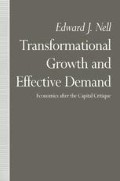Abstract
Neo-Classical theory roots value in the act of exchange, which is undertaken by the parties in order to gain. The theory shows that under the postulated conditions all parties will gain from exchange in terms of their subjective preferences. This then generalizes into the theory of optimal allocation of scarce rewards by means of the price mechanism, which makes it possible to incorporate production into the theory as a special case of indirect exchange. Value arises from the interactions of isolated, rootless ‘individuals’ acting in terms of their abstract ‘preferences,’ expressed as a consistent ranking of the bundles of commodities assumed to be ‘available’ on the one hand and ‘scarce’ on the other. Where these individuals come from, how they are supported, what their preferences are based on, how and by whom the commodities have been produced, and by whose authority the ‘initial endowments’ were conferred — all are assumed to be irrelevant to the foundation of value-in-exchange. Whatever the answers to such questions, value arises because the parties to exchange stand to gain in terms of their preferences, so long as these are consistent and ‘convex,’ and goods are scarce. Value arises from convex preferences coupled with scarcity.
* Public Interest, Fifteenth Anniversary Issue: ‘The Crisis in Economic Theory’ (1980). Reprinted in D. Bell, and L. Kristel (eds) The Crisis in Economic Theory (New York: Basic Books, 1982).
Access this chapter
Tax calculation will be finalised at checkout
Purchases are for personal use only
Preview
Unable to display preview. Download preview PDF.
Bibliographical Notes
M. Hollis and E. Nell, Rational Economic Man (Cambridge: Cambridge University Press, 1975).
M. Lutz and K. Lux, Humanistic Economics: Fundamentals and Applications (Boston: Benjamin-Cummins, 1979).
J. Robinson, Economic Heresies: Some Old-Fashioned Questions in Economic Theory (New York: Basic Books, 1971).
V.C. Walsh and H.N. Gram, Classical and Neo-Classical Theories of General Equilibrium: Historical Origins and Mathematical Structure (Oxford: Oxford University Press, 1980).
The most fundamental work providing the basis for a critique of modern economics is P. Sraffa, Production of Commodities by Means of Commodities (Cambridge: Cambridge University Press, 1960). That this work lays the groundwork for powerful — some would say decisive — criticism of marginalist theory is well known. An apparent paradox, however, is that these same foundations provide the basis for the critique of the Labor Theory of Value.
I. Steedman, Marx After Sraffa, New Left Books, 1977.
G. Hodgson, ‘Exploitation and Embodied Labor Time,’ Bulletin of the Conference of Socialist Economists (March 1976).
M. Morishima, Marx’s Economics: A Dual Theory of Value and Growth (Cambridge: Cambridge University Press, 1973); and, with qualification, ‘Marx in the Light of Modern Economic Theory,’ Econometrica (1974).
J. Roemer, ‘Marxian Models of Reproduction and Accumulation,’ Cambridge Journal of Economics (March 1978). E. Wolfstetter, ‘Positive Profits with Negative Surplus Value: A Comment,’ Economic Journal (1976). G. Abraham-Frois and E. Berrebi, Theory of Value, Prices and Accumulation: A Mathematical Integration of Marx, von Neumann and Sraffa (Cambridge: Cambridge University Press, 1976). W.J. Baumol, ‘The Transformation of Values: What Marx “Really” Meant (an Interpretation),’ Journal of Economic Literature (March 1974). D. Laibman, ‘Values and Prices of Production: The Political Economy of the Transformation Problem,’ Science and Society (Winter 1973–4).
F. Roosevelt, ‘Cambridge Economics as Commodity Fetishism,’ Review of Radical Political Economics (Winter 1975). Reprinted in E. Nell (ed.), Growth, Profits and Property (Cambridge: Cambridge University Press, 1980). H. Ganssmann, The Use Value of Marx’s Theory of Value, unpublished manuscript. P. Armstrong, A. Glyn, and J. Harrison, ‘In Defense of Value — A Reply to Ian Steedman,’ Capital and Class (Summer 1978). A. Shaikh, ‘Political Economy and Capitalism: Notes on Dobb’s Theory of Crisis,’ Cambridge Journal of Economics (March 1978). Reprinted in Political Economy in the New School (New School for Social Research, 1980). A. Shaikh, ‘Political Economy and Capitalism: Notes on Dobb’s Theory of Crisis,’ Cambridge Journal of Economics (March 1978). Reprinted in Political Economy in the New School (New School for Social Research, 1980).
D. Yaffe, ‘Value and Price in Marx’s Capital,’ Revolutionary Communist (January 1975).
S. Amin, The Law of Value and Historical Materialism (New York: Monthly Review Press, 1978).
S. Bowles and H. Gintis, ‘The Marxian Theory of Value and Heterogeneous Labor: A Critique and Reformulation,’ Cambridge Journal of Economics (June 1977).
D.G. Champernowne, ‘A Note on John von Neumann’s Article on “A Model of General Economic Equilibrium,”’ Review of Economic Studies (1945–6).
A. Lowe, The Path to Economic Growth (Cambridge: Cambridge University Press, 1976), with Appendix by E.J. Nell.
E.J. Nell, ‘Models of Behaviour with Special Reference to Certain Economic Theories,’ thesis (1964).
J. von Neumann, ‘A Model of General Economic Equilibrium,’ Review of Economic Studies (1945–6).
B. Schefold, Theorie der Kuppelproduction (private print, 1971).
A. Shaikh, ‘The Transformation from Marx to Sraffa (Prelude to a Critique of the Neo-Ricardians),’ (1982), in A. Corchuelo, ed., Nuevos Desarrollos de la Teoria Economica (Cali-Columbia: CIDSE Universidad del Valle).
Author information
Authors and Affiliations
Copyright information
© 1992 Edward J. Nell
About this chapter
Cite this chapter
Nell, E.J. (1992). Value and Capital in Marxian Economics. In: Transformational Growth and Effective Demand. Palgrave Macmillan, London. https://doi.org/10.1007/978-1-349-21779-3_3
Download citation
DOI: https://doi.org/10.1007/978-1-349-21779-3_3
Publisher Name: Palgrave Macmillan, London
Print ISBN: 978-1-349-21781-6
Online ISBN: 978-1-349-21779-3
eBook Packages: Palgrave Political & Intern. Studies CollectionPolitical Science and International Studies (R0)

